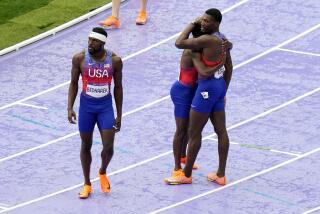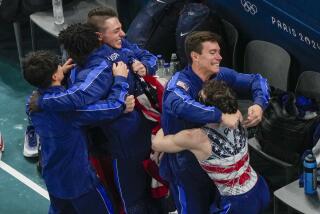Hackl Wins; Kennedy Is 10th : Luge: German was second at Calgary in ’88. Austrians win silver and bronze medals.
- Share via
LA PLAGNE, France — Two not-so-unusual events occurred Monday at the luge track: It snowed, and the U.S. was shut out of medals.
While they watched the medals in men’s singles handed out to German and Austrian sledders, the U.S. lugers settled for two spots in the top 12, took comfort in claiming their best Olympic finish and even managed to impress George Steinbrenner.
Steinbrenner, vice president of the United States Olympic Committee, dropped by with USOC Executive Director Harvey Schiller and gave his blessing to the U.S. performance.
“This is tremendous, they’re coming,” Steinbrenner said. “They’ve got to be tickled pink with this. They deserve a pat on the back. We’re evaluating our athletes on improvement now, not medals, and I give the lugers an A-plus in improvement.”
There still wasn’t a medal, of course, but the United States seemed content with what it got.
“We could have done better, but this is how it came out,” Coach Wolfgang Schaedler said.
Duncan Kennedy’s 10th-place finish was the best effort by an American since the luge became part of the Games in 1964.
Wendel Suckow of Marquette, Mich., was 12th, matching the previous best U.S. finish, by Frank Masley at the Calgary Games in 1988. Eighteen-year-old Robert Pipkins of Staten Island, N.Y., was 21st Monday.
The top three sledders from Sunday’s first two runs held onto their positions through the final two heats over the icy chute. Germany’s Georg Hackl won the gold, World Cup champion Markus Prock of Austria the silver and countryman Markus Schmidt the bronze.
Kennedy, of Lake Placid, N.Y., America’s best luger and a medal favorite, found himself unable to come close to matching his form of the World Cup season, during which he finished second by a point in the final standings. Kennedy’s chances for a medal were chilled when he dropped from No. 6 to No. 12 on his second run Sunday.
“I’m disappointed, but what can you do?” Kennedy said. “You can’t win them all, I guess.”
Asked what had gone wrong, Kennedy was flippant: “I didn’t go fast enough.”
Hackl had no such problem. A silver medalist behind countryman Jens Muller at Calgary in 1988, Hackl posted the fastest time in three of the four heats Sunday and Monday.
“It’s the Olympics, you know, and today the right people won,” Schaedler said. “I guess the whole way it wasn’t our day.”
The U.S. hopes rode on Kennedy’s sled, but he skidded coming out of two turns on his second run Sunday, ending his chances for the first American medal in luge.
The top Olympic finish by a U.S. luger remains Bonny Warner’s sixth-place finish at Calgary.
Schaedler insisted that he was not disappointed by the results and said Kennedy could have been pressing.
“Maybe he pushed too hard,” he said. “It’s hard to find an answer right now.”
Kennedy, who avoided interviews after the first day’s competition, didn’t blame the track or his sled.
“It’s me,” he said. “Obviously, my runs weren’t the best.
“I don’t think it was pressure. I don’t think I was expecting too much at all. I wasn’t nervous, (but) the Olympics have been kind of a curse for me in a way.
“To tell you the truth, after my last training runs, I didn’t even expect 10th place. My training went really bad.”
Kennedy, who finished 14th at the Calgary Games, said he had a difficult time pulling himself together after losing the World Cup title to Prock on the sixth and final race last month in Calgary.
“I tend to overreact and right off I was extremely defeated mentally,” he said. “I got it going again, but it was hard. Then I had really bad training runs here. I thought it might have been my sled, but it wasn’t my sled. I don’t know why it happened, it just happened.”
More to Read
Go beyond the scoreboard
Get the latest on L.A.'s teams in the daily Sports Report newsletter.
You may occasionally receive promotional content from the Los Angeles Times.






